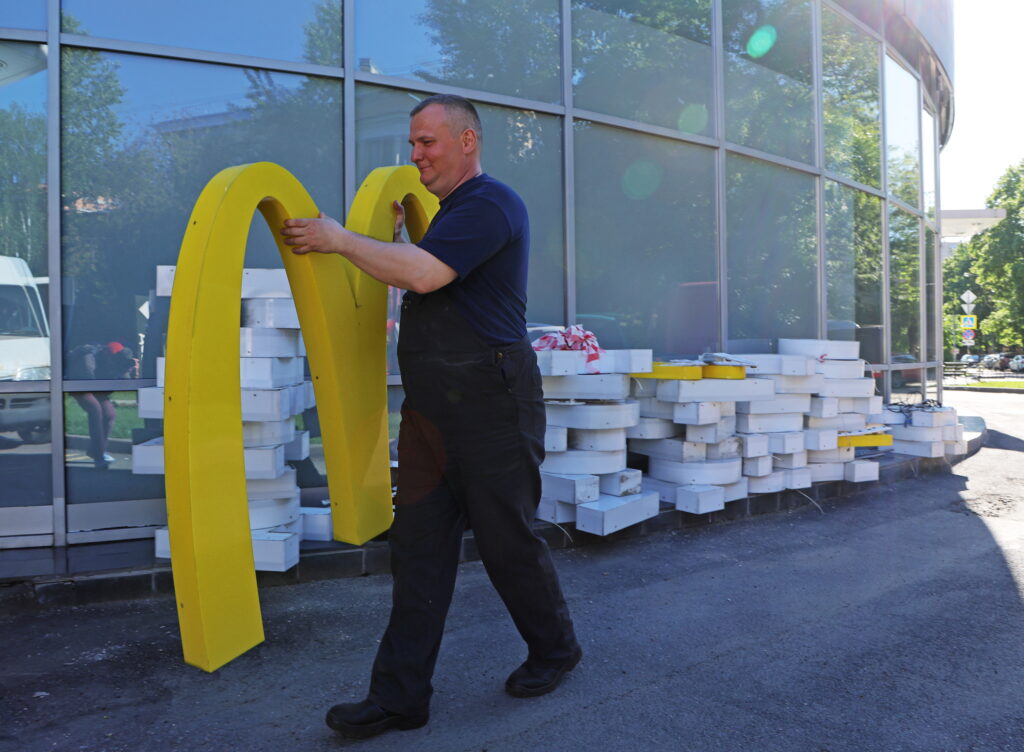The war in Ukraine has shifted the balance in the global trade in cars, turning some countries without car manufacturing facilities into major exporters. More precisely, those countries have become re-exporters, i.e. they import goods with the intention of reselling them subsequently to other countries. In relatively peaceful times, re-exports are a standard tool for keeping international trade going. However, in times of military conflict they become a means of circumventing the sanctions imposed on the aggressor country.
Sanctioning countries prohibit third countries from re-exporting their goods that fall under sanctions. However, it is not easy to comply with this ban. Firstly, there is a flourishing ‘industry’ engaging in the supply of prohibited goods, which involves multiple intermediaries, resellers and fictitious firms that weave complex distribution networks, while the inspection authorities in third countries are often unable to track down violators. Secondly, these authorities themselves are not sufficiently active in identifying and punishing violators or in suppressing circumvention channels since re-exports become an important source of budget revenues, foreign exchange earnings and support for business activity in those countries.
As a consequence, prohibited dual-use goods continue to flow from the European Union to Russia, which is the world leader in terms of the number of sanctions imposed. The total value of such goods reached USD 2 billion in 2022. Western countries are actively imposing restrictions on third-country organisations involved in circumventing sanctions. For example, the recently adopted 13th package of EU sanctions against Russia imposed restrictions on companies from India, Sri Lanka, China, Serbia, Kazakhstan, Thailand and Turkey, while more than 300 entities and individuals from nearly 60 foreign jurisdictions have already fallen under the US blocking sanctions imposed since February 2022.
Discussions on how to tighten secondary sanctions often mention Georgia. Situated at the intersection of geopolitical tensions and seeking membership in the European Union, Georgia does not impose its own sanctions against Russia and even develops trade with its big neighbour, despite the absence of diplomatic relations. This ambiguous position turns Georgia into a country that Russia can use to circumvent sanctions and ensure a supply of sanctioned goods. Moreover, the sharp increase in cars re-exported from Georgia after the outbreak of war in Ukraine provides a good reason to suspect that the Georgian authorities might be instrumental in circumventing sanctions. However, the devil is in the details.
Context
Shortly after the outbreak of the war, global car manufacturers from the so-called ‘unfriendly’ countries suspended their activities in Russia: they sold assets, stopped importing their cars and left the market. Separately, the G7 countries and the European Union imposed a ban on the supply of luxury goods, including expensive cars, to Russia. Later on, a ban was imposed on the export of all new and used passenger cars (with engine capacity of more than 1,900 cc), as well as electric and hybrid cars, regardless of their value.
Nevertheless, despite these restrictions, cars from many Western manufacturers continued to be delivered to the Russian market through various channels of legalised parallel imports, and the Russian Federal Customs Service declared that the economic blockade of Russia had been ‘broken’ through Verkhny Lars, the only land checkpoint on the border between Russia and Georgia. As a result, KIA, Hyundai and Toyota were included among the Top 10 brands in terms of new passenger car sales in Russia in 2023, while sales of sanctioned prestige and luxury cars even increased year-on-year.
Such facts may create the impression that sanctions do not work and are ineffective. However, they do not lead to sanctions being completely abandoned as an instrument of political and economic pressure. Instead, the recent focus of sanctions-imposing authorities has been on improving the mechanisms to monitor compliance with the existing restrictions among organisations and financial institutions, regardless of their country of origin, and on tightening the fight against circumvention of the sanctions.
Georgia’s position
Without imposing its own sanctions against Russia, Georgia nevertheless declares its full compliance with the US and EU sanctions rules. Therefore, shortly after the adoption of the 11th package of EU sanctions in the summer of 2023 and the subsequent US restrictive measures, aimed primarily at countering the circumvention of sanctions, Georgia banned re-exports of all categories of sanctioned vehicles to Russia.
Georgian customs authorities immediately tightened the control process and have conducted stricter inspections of products exported to Russia since that time, preventing the delivery of sanctioned goods, including those in transit from Armenia. The EU, US and UK special sanctions envoys conduct regular monitoring in Georgia to ensure compliance with the sanctions regime. According to German Ambassador Peter Fischer, «there are no serious examples of circumvention of sanctions through the territory of Georgia» at the moment. The European Commission’s report, published on 8 November 2023, also reaffirms Georgia’s commitment to efforts aimed at preventing its territory from being used to circumvent sanctions.
Ever since Georgia was granted the EU candidate status in December 2023, one of the key political priorities for its authorities has been to bring the country’s legislation in line with EU rules and standards as soon as possible, leaving ever fewer reasons to suspect that Georgia may intend to help circumvent sanctions against Russia. This happened even though passenger cars were Georgia’s third largest export commodity to Russia in the first half of 2023, bringing tangible revenues to the state budget (3,786 cars with an average customs value of USD 14,000 were transported to Russia for a total of USD 53 million, which was 274% higher compared to the same period of preceding year). A total of 51,011 passenger cars worth USD 991 million were re-exported from Georgia to other countries during this period, and car re-exports accounted for a substantial 33% of Georgia’s foreign trade. After the introduction of restrictions, re-exports of cars from Georgia to Russia practically dropped to zero (in August 2023, merely 85 cars were imported, which was 12 times less than in July 2023 and nine times less than in August 2022, and only 15 cars were imported in the entire fourth quarter of 2023).
Obviously, the restrictions have become a sensitive issue for the Georgian economy, which was emphasised by the Georgian Minister of Economy Levan Davitashvili, who expressed hope that re‑exports of vehicles from Georgia would not stop, and stressed that the sanctions prohibit re‑exports only to Russia, but not to other countries.
‘Clandestine’ re-exports
After the ban was introduced, Georgian car re-exports were reoriented towards the Eurasian Economic Union (EAEU) countries: in the second half of 2023, the volume of re-exports to Armenia, Kazakhstan and Kyrgyzstan increased by 172% compared to the first half of 2023, reaching 51,461 cars. If we compare the annual 2023 data with 2021, the growth rate amounted to 1340%. Since the EAEU has a common customs area, which includes Russia, there is a possibility that sanctioned cars imported from Georgia will nevertheless end up in the Russian market. Moreover, the extensive use of ‘grey’ re-export channels to Russia from the EAEU countries has been confirmed, for example, in the materials prepared by international organisations or in journalistic investigations concerning Armenia, Kazakhstan and Kyrgyzstan. Moreover, these loopholes are being actively exploited by professional private sellers, causing tangible economic damage to Russian car manufacturers. In this connection, the Russian government is planning to introduce a special duty on private car imports in the near future in order to protect its domestic manufacturers from unfairly playing competitors.
The grey re-export channels are also used to deliver sanctioned cars to Russia directly through Georgia, as recent investigations by Georgian journalists have confirmed. The cars are transported to Russia using a rather sophisticated scheme involving Russian businessmen-bloggers who have emigrated to Georgia: a car is delivered to the Georgian-Russian border and placed in a car park, it then gets registered in the carrier’s name and assigned a temporary registration number. The carrier insures the car and takes it to Russia by himself/herself, without customs clearance. On the Russian side, the carrier meets the recipient and they sign a sales contract, and afterwards the carrier simply returns to Georgia. This route can be covered several times within a single day.
It is important to note that cars which are transported in this way are not counted towards Georgia’s export statistics. Thus, although the official re-export volumes to Russia were brought to zero after the ban was imposed, the number of cars shipped via this circumvention scheme might be as high as several hundred per month, according to various estimates.
Interestingly enough, similar loopholes are also being actively exploited in EU countries bordering Russia, such as Lithuania or Finland, with cars worth dozens of millions of euros being re‑exported via this channel in 2023. This practice clearly encourages audacious entrepreneurs to get involved in bypassing sanctions, but it has also led to tougher penalties against violators imposed by the sanctions authorities of Western countries. To date, the bulk of secondary sanctions have been imposed on private infringers, i.e. organisations from third countries. However, further efforts to tighten the sanctions regime against Russia may involve restrictions imposed directly against third countries or their official bodies, especially since such proposals are periodically put forward in the public sphere.
Risks
Despite the prevalence and complexity of methods applied to evade sanctions on car imports to Russia, they are not difficult to stop as long as there is political will. After the discovery of an evasion scheme, the local customs authorities in Lithuania launched an investigation, which identified companies involved in these shipments, and a restriction on re-exporting cars to third countries was imposed until the end of the investigation. In the meantime, Lithuanian authorities introduced new requirements for exporters: they are supposed to provide the customs authorities with information on the end buyer of the vehicle and to undergo enhanced customs inspection to ensure compliance with the sanctions regime.
Despite the official suspension of re-exports of sanctioned vehicle categories, the Georgian authorities have so far shown no intention to identify and suppress ‘grey’ channels used for direct car shipments to Russia. Regarding the re-exports of cars to the EAEU countries, Georgia views them as a way to develop international trade without violating the sanctions regime, and will likely not take any restrictive measures until Armenia, Kazakhstan and Kyrgyzstan impose restrictions on re‑exports to Russia from their territories, or until Western countries further tighten their monitoring of third countries’ compliance with sanctions.
Despite its appeal, this strategy does not contribute to the convergence of the foreign and security policies between Georgia and the European Union, which are currently only 43% aligned. Moreover, this strategy entails serious risks of secondary sanctions being imposed against Georgia and the number of Georgians on the sanctions lists being significantly expanded. At the moment, those lists include only one Georgian name, incorporated in the United States Specially Designated Nationals and Blocked Persons List (SDNs).










